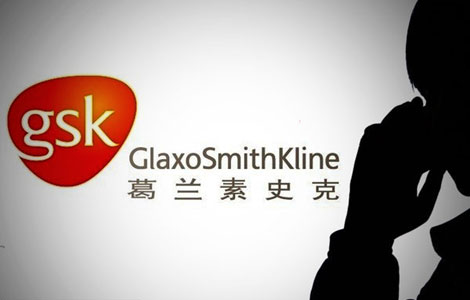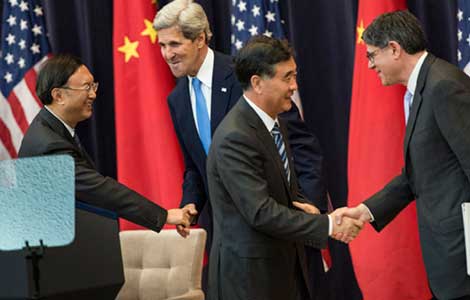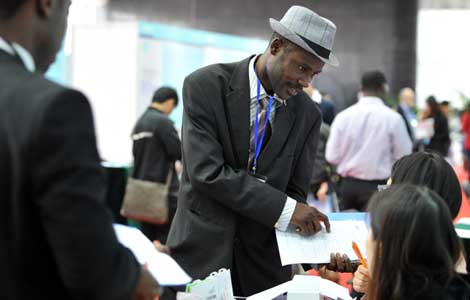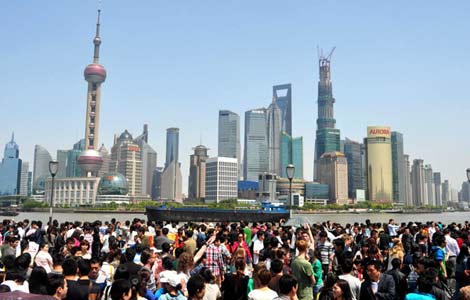What's news
Updated: 2013-07-11 07:30
(China Daily)
|
||||||||
Crude imports fall in H1 due to slowdown
China's crude imports fell in the first half of 2013 compared with the same period last year, raising the prospect that slowing growth in the world's second-largest economy may lead to lower-than-expected global fuel consumption this year. With oil imports dropping and China warning of a "grim" trade outlook on Wednesday, the world's second-biggest oil consumer may not be the buoyant force it has been for oil markets in the past decade. "There is most certainly a risk that global oil demand growth will miss forecasts because of the slowdown in China," said Ben Le Brun, an analyst at OptionsXpress in Sydney.
$630m of deals made in three-country trade fair
Agreements for 12 projects worth 3.86 billion yuan ($630 million) were signed at the 9th annual China-Russia-Mongolia Trade & Commodities Fair in Hailar, a district of Hulubuir in the Inner Mongolia autonomous region. The event, which closed on Tuesday, attracted 300 companies from the three countries as well as from Nepal, the Republic of Korea and Singapore. Hulubuir has seven border crossings with Russia and Mongolia, and the district of Hailar is a major international trade hub in Northeast China.
CNOOC, Sinopec to add refinery capacity
China National Offshore Oil Corp has started building a processing facility at its Huizhou refinery, the company said on its website on Wednesday. The capacity of the plant in southeast Guangdong will be raised to 22 million tons a year from 10 million tons a year initially, the company said. The expansion is expected to be completed by 2014, according to data compiled by Bloomberg. Meanwhile, China Petroleum & Chemical Corp, which is known as Sinopec and is Asia's largest refiner, is planning to bring forward an expansion of its Yangzi refinery in east China this year, the company said in a newsletter on June 14. The Nanjing city facility will have a capacity of 12.5 million tons a year after the expansion work.
Money market rate drops to 6-week low
China's money-market rate dropped to a six-week low as the central bank refrained from draining funds, further easing a cash squeeze. The seven-day fixing rate, which measures funding in the banking system, declined 1 basis point to 3.59 percent, the lowest since May 28, according to a National Interbank Funding Center rate set at 11 am in Shanghai. The rate reached an all-time high of 10.77 percent on June 20. The People's Bank of China hasn't sold bills to withdraw funds since June 20, when the overnight repo rate also climbed to an unprecedented level amid the worst cash crunch on record. The PBOC may resume sales of the securities should the one-day fixing, which was little changed at 3.3 percent, drop below 3 percent, said Tian Jiachao, a bond analyst in Shenzhen at China Merchants Bank Co, the nation's sixth-biggest lender.
Govt may allow RMB to depreciate during H2
China may allow the yuan to weaken in the second half to aid exports after June shipments contracted by the most since the global financial crisis, according to economists from UBS AG to Citigroup Inc. The currency should be allowed to depreciate "at least marginally," Wang Tao, chief China economist at UBS in Hong Kong, said. Ding Shuang, Citigroup's senior China economist, expects "periodic depreciation," while Credit Suisse Group AG's Tao Dong said he anticipates a "minor" decline against the US dollar. Exports unexpectedly fell 3.1 percent last month, while imports dropped 0.7 percent, official data showed, underscoring the severity of the slowdown in the world's second-biggest economy as Premier Li Keqiang reins in credit.
Gold declines on weak Chinese export figures
Gold declined after China's exports unexpectedly fell in June and as investors await minutes from the US Federal Open Market Committee's meeting last month amid bets the Federal Reserve will begin reducing stimulus. Bullion for August delivery was little changed at $1,246 an ounce on the Comex. Prices slumped 26 percent this year, set for the biggest annual drop since 1981, as some investors lost faith in the metal as a store of value. Fed Chairman Ben Bernanke said in June the central bank may slow its $85 billion in monthly bond purchases if the economy continues to improve.
Hot money inflow tackled in May, customs says
The inflow of speculative money disguised as payments for trade between the mainland and Hong Kong was tackled in May, Zheng Yuesheng, spokesman for the General Administration of Customs, told a news conference on Wednesday. Data concerning export trade to the region was more reflective in June, he said. Trade data in the first four months was inflated by speculative funds, or "hot money", covered as trade payments, to avoid capital controls and take advantage of currency appreciation, Zheng said. The State Administration of Foreign Exchange, China's foreign exchange regulator, boosted its scrutiny of export invoices, and imposed tougher penalties on companies giving fake data since late April.
Yangtze River conservation project announced
A water conservation project for the Yangtze River was announced on Wednesday. The project involves Coca-Cola China, the State Forestry Administration and the World Wildlife Fund. The Yangtze River, which accounts for 34 percent of China's fresh water resources, plays a critical role in China's biodiversity. "We are very pleased to work with the State Forestry Administration and the WWF on the future of China's wetlands," said Ahmet Bozer, president of Coca-Cola International. "This is part of our endeavor to seek solutions that balance economic development and environmental protection."
TCL says net profits in H1 probably doubled
Chinese TV maker TCL Corp expects net profits to double in the first half of 2013, reaching up to 660 million yuan ($107 million). In an earnings forecast issued on Tuesday, TCL said all major business sectors in the company saw good sales growth in the first half of the year. TCL manufactured about 650,000 liquid crystal display screens during the period, up threefold over the same period last year. It sold more than 8 million LCD TVs, an increase of 21.6 percent year-on-year. Meanwhile, the company continued to push forward the mobile phone business. In the first six months, TCL shipped 20.6 million mobile phones, of which 4.7 million were smartphones, up 113 percent year-on-year.
Lille wants to attract Chinese investment
Officials from Lille, northern France, vowed greater efforts on Tuesday to target Chinese investment. Special focus will be placed on three regions: Beijing, Shanghai and Guangzhou, said Yann Pitollet, chief executive officer of the Investment Promotion Agency for Northern France. Pitollet is visiting Shanghai and neighboring cities, looking for market opportunities with local governments and companies. To date, 10 Chinese companies have invested in Lille.
China Daily - Agencies
(China Daily USA 07/11/2013 page14)

 China investigates GSK executives for bribery
China investigates GSK executives for bribery
 China, Russia complete 3-day joint naval drill
China, Russia complete 3-day joint naval drill
 US drone completes 1st carrier landing
US drone completes 1st carrier landing
 Sino-US talks 'help build trust'
Sino-US talks 'help build trust'
 Boston Marathon bombing suspect pleads not guilty
Boston Marathon bombing suspect pleads not guilty
 Caution urged in seeking experts from abroad
Caution urged in seeking experts from abroad
 Shanghai struggles with growth
Shanghai struggles with growth
 Trade town turns to tourism
Trade town turns to tourism
Most Viewed
Editor's Picks

|

|

|

|

|

|
Today's Top News
Senators skeptical about Smithfield deal
Beijing has world's most delayed airport
Caution urged in seeking experts from abroad
Snowden is likely Venezuela bound
Talks 'help build trust' between China, US
Obama pushes House Republicans on immigration
Chinese researcher pleads guilty in US drug case
US Navy completes 1st unmanned carrier landing
US Weekly

|

|





